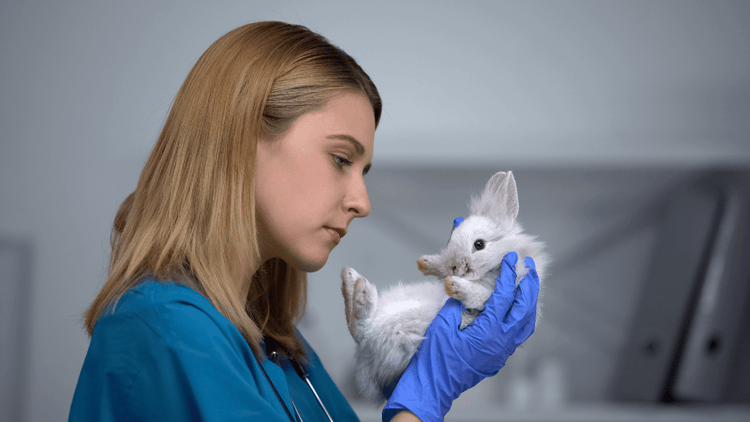
Gastric Bloat in Rabbits
Gastric bloat is a life-threatening emergency. In this condition, the stomach fills up with gas and fluids that causes a cascade of local and systemic problems that can quickly lead to death. Bloat can begin with symptoms of gastrointestinal hypomotility and gastric stasis and progress to “bloat”. This is a common condition in rabbits.
The problem is more common in rabbits than many other species because rabbits cannot vomit. They have a very well developed valve proximal to the stomach that prevents vomiting. So any accumulation of fluid or saliva that can’t leave the stomach causes dilatation. These fluids sit in the stomach and are fermented producing gas and further dilation.
Bloating is caused by an “outflow obstruction”. This “outflow obstruction” is something that prevents the food and fluids from leaving the stomach (hence flowing “out”). This can be caused by a foreign object being caught in the stomach such as from eating an inappropriate item (for example plastic or carpet), obstruction caused by impacted hair, or from a tumor, abscess, or hernia. In some cases – the underlying cause cannot be determined.
As the stomach enlarges, it becomes painful. The enlargement reduces the blood supply to the stomach (gastric ischemia) and this can lead to shock. This is an EMERGENCY.
Gastric bloat can occur in any age, sex, or breed rabbit.
Symptoms of Gastric Bloat in Rabbits
Typically, clinical signs of bloat include loss of appetite or not eating. Symptoms often start with rabbits that stop eating pellets but will continue to eat treats followed by total lack of appetite. Rabbit owners should watch out for these common signs of gastric bloat:
- Distended abdomen
- Decreased appetite quickly leading to total anorexia (no appetite)
- Decreased fecal production (small or very few fecal pellets)
- Pain (rabbits often show hunched posture, grinding of teeth)
- Decreased activity (often a sign of pain)
Rabbits that are bloated will die in 4 to 24 hours if untreated.
Diagnosing Gastric Bloat in Rabbits
To test for gastric bloat, your vet may do all or some of the following:
- Your veterinarian will perform a physical examination including feeling the abdomen and an oral exam.
- Radiographs (x-rays) of the abdomen are recommended and will show severe distention of the stomach.
- Blood tests may be recommended to determine if underlying organ malfunction is present.
Treating Gastric Bloat in Rabbits
This disease is an emergency. Immediate treatment is required and consists of fluid therapy and gastric decompression.
Fluids are a critical component of the treatment. Severe shock or dehydration results in a drop in blood pressure which decreases the blood supply to major organs and contributes to the hypothermia and shock. Fluid replacement to treat the dehydration and low blood pressure should be administered through an intravenous (in the blood vessel) catheter.
Gastric decompression is performed by sedating the rabbit and passing a tube through the mouth and into the stomach. Some rabbits will have large amounts of hair, food and hay that block the tube and preventing adequate decompression. Immediate surgical intervention is then required. Repeat decompressions may be necessary.
Warmth is also very important. Sick rabbits expend a lot of energy fighting off infections and trying to stay alive. Providing warmth will reduce the amount of energy required to maintain their body temperature.
Exercise is encouraged when the outflow is established to help encourage gastric motility. Dietary therapy is important after the outflow obstruction is removed. Generally a large selection of fresh greens (romaine lettuce, parsley, spinach, collard greens and/or cilantro) are offered as well as a good quality grass hay such as Timonthy.
For patients that refuse to eat, a gruel is offered and gently syringe fed. A common gruel is Critical Care for Herbivores (Oxbow Pet Products) or Emeraid Herbivore (Lafeber). Another option is to grind pellets and mix with fresh greens to form a gruel. Oral water intake is encouraged by offering fresh water, or wetting the fresh greens.
Analgesics (pain medications) help alleviate abdominal discomfort. Commonly used drugs to treat gastrointestinal pain are butorphanol, buprenorphine, hydromorphone, oxymophone. Drugs to teat or prevent gastric ulcerations may include cimetadine (Tagment) or ranitidine (Zantac). Antibiotic use is controversial.
Common complications are gastric rupture and/or kidney failure in the early post-operative period. Early and aggressive medical care still carries a very guarded prognosis. Gastric dilatation can recur. Many pets can go in to kidney failure after surgery. Pets should be monitored closely for 72 hours post-op. After 3 days in patients that are recovering well – the prognosis for complete recovery is good.
Once your rabbit is out of the hospital and back at home, it is important to maintain the treatment protocol regimented by your veterinarian.
Make sure you feed your rabbit a balanced diet of some pellets with lots of fresh greens. Proper digestive tract health requires grasses and high-quality long-stemmed hay. Don’t overfeed any cereal such as bread, breakfast cereals or crackers, sweets or large amounts of fruit. Minimize obesity and encourage routine exercise. Minimize stressful conditions.